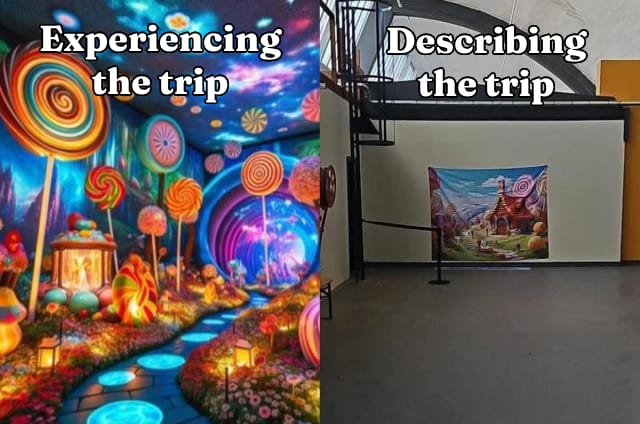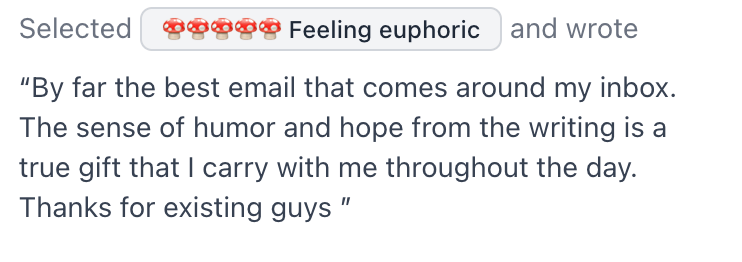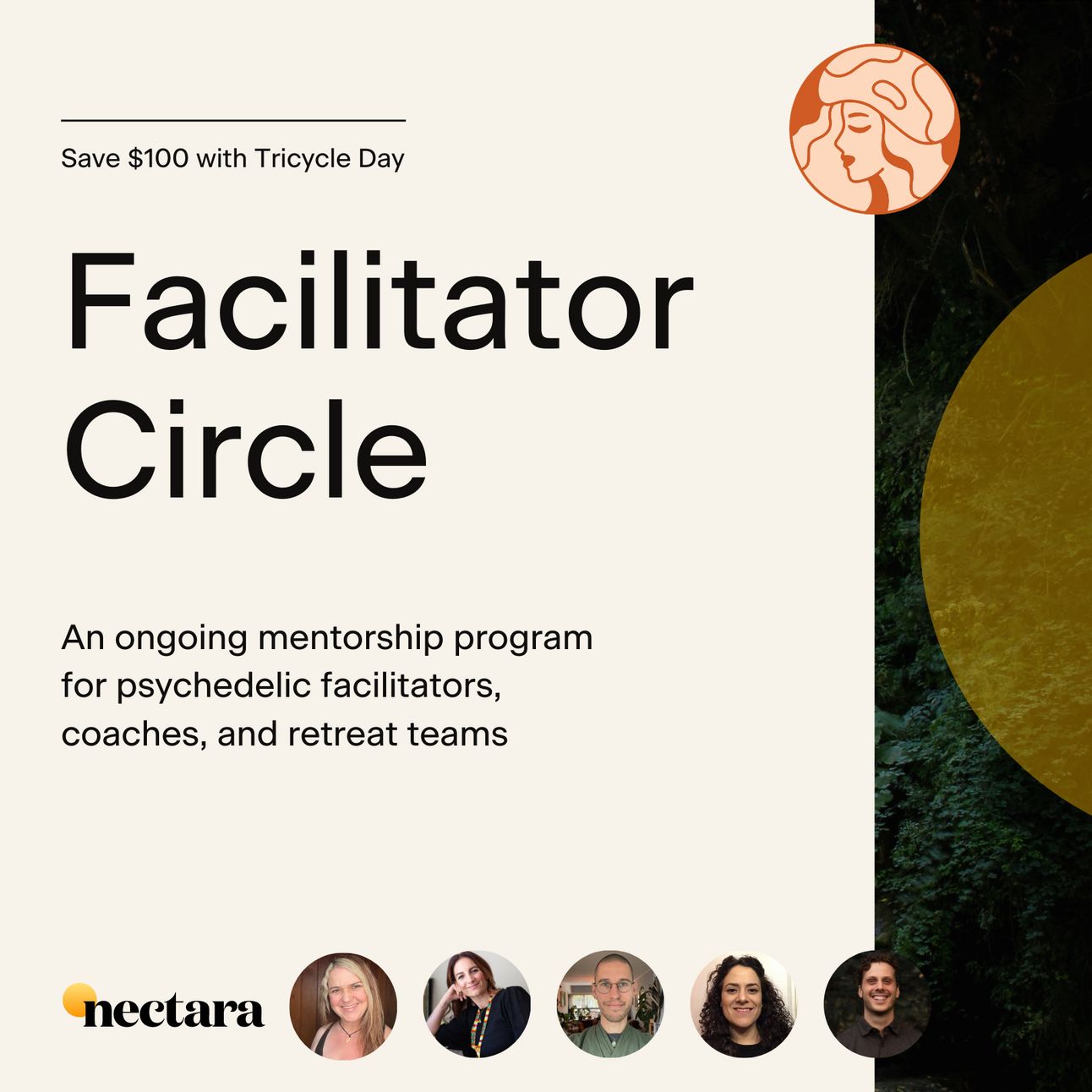Welcome to Tricycle Day. It’s almost Bicycle Day, our favorite holiday of the year. Whether you’re pedaling two wheels or three, be safe out there, kiddos!
Here’s what we got this week.
Can psychedelic therapists get informed consent? 🤔
Living through trauma on psychedelics 😵💫
MDMA-assisted therapy critics organize petition 🛑
Have a cuppa to support psychedelic therapy ☕️
FROM OUR SPONSORS
Bicycle Day isn’t the only holiday this month, ya know.
Aficionados of all mind-altering plants are getting ready to celebrate 4/20, too.
And HempLucid is here to help you stock up for the big day.
Right now, they’re offering 42.0% off everything site wide (no code necessary). If you drop $250 or more, they’ll even send you their VIP box with a ridiculous amount of free stuff.
(Think certified-organic, US-grown hemp, plus mushrooms and more.)
The sale ends on 4/23, so hop on it.

MICRODOSES
🔬 Research
No one’s plotting against you: Psilocybin use is not linked to paranoia, according to a meta-analysis of 6 clinical trials.
Not a panacea: Psychedelics may be risky for people with personality disorders.
Inner healer: People who believed their body or mind was healing itself were more likely to see results from psilocybin therapy.
Eurotrip: The EU has launched PsyPal, its €6.5M clinical research project on psychedelic-assisted therapies.
Too much research? The hundreds of psilocybin clinical trials may actually be slowing down approval.
🏛️ Policy
Win for Wiener: A Senate committee has passed California’s bill to legalize facilitated psychedelic use.
Lion’s Maine: A bill to create a psychedelics commission for Maine heads to the governor’s desk.
K fine, no taxes then: The motion to regulate psychedelic dispensaries in Vancouver was shot down by city council.
Seeing dollar signs: Why some diehard psychedelic advocates are opposed to the legalization ballot in Massachusetts.
Is nothing sacred? Indigenous Colombian shamans are getting jailed for carrying ayahuasca.
📈 Business
Jobs with benefits: More companies are offering psychedelic-assisted therapy coverage to their employees.
Meow meow: Clearmind Medicine has filed a patent for the use of 3-MMC to treat eating disorders.
OK! Awakn is expanding into the US with new clinics in Oklahoma.
War and peace: Speakers are boycotting MAPS Israel’s conference in response to the Gaza invasion.
Holy business: The world’s largest megachurch is making $5 million a year selling mushrooms and weed.
🫠 Just for fun
Where it all began: What is Bicycle Day anyway?
Tee up: Soon this golfer’s paradise may offer psilocybin to raise your game.
Paper trail: How a Supreme Court ruling made blotter paper the most common delivery method for LSD.
Meme of the week: Reporting your psychedelic therapy income on your taxes…
THE PEAK EXPERIENCE

When no means no and yes means you have no idea
You ever caught yourself trying to explain a life-changing trip to a friend?
Usually goes something like this:
“Yeah, bro. Total oneness. Like I realized we’re all connected, bro. Everyone and everything. I processed some childhood stuff too though. Sh*t’s deep. Don’t expect it to be easy. You gotta be ready to do the work, bro.”
Hm, yeah. Insightful.
Now, imagine this is your job. As a psychedelic facilitator—or any kind of health care provider, for that matter—you have a responsibility to obtain “informed consent” from your patients.
In other words, practitioners have to be able to describe what can happen in a procedure, so that clients can decide whether they want to go forward.
So, how are psychedelic therapists supposed to do that, when their intervention escapes all language?
That’s the question raised in a new article in JAMA Psychiatry. While the authors appreciate the challenges, they propose 7 essential components of informed consent for psychedelic therapy that are often overlooked.
😵💫 Acute and chronic perceptual changes. Translation: Things could get weird.
✨ Personality changes and altered metaphysical beliefs. You might get weird.
💆 Role of limited physical touch. Cool if we hold your hand?
🤬 Potential for patient exploitation and abuse. You’ll be highly suggestible.
📊 Data collection and research. We’re still learning.
📝 Practitioner disclosures. Get to know me, too.
🧑💻 Interactive patient education and comprehension assessment. Let’s make sure you understand.
No doubt, psychedelic experiences are difficult—some would say, impossible—to put into words. And they can vary widely from person to person, trip to trip.
Considering the role of set and setting, it’s also likely that the informed consent process itself could affect patients’ experiences.
This is a tricky one, Cyclists. What do you think? Is informed consent even possible with psychedelics? Reply and let us know. 🫠
AFTERGLOW

You thought your trip was scary
There are some experiments you could never replicate in a lab. Assuming you’re not a psychopath, you wouldn’t want to, either. But when you have the opportunity to learn from tragedy, there’s arguably a moral and scientific imperative to dig in. So, that’s what Israeli researchers are doing. After the Oct 7 terrorist attack on the Tribe of Nova music festival, they’re following survivors to study the interaction of trauma and psychedelics.
University of Haifa researchers have already surveyed 650 Nova survivors, and—as expected—a good chunk of them were tripping and/or rolling. So now, the scientists want to answer two questions—what’s it like to experience a traumatic event under the influence of different psychedelics, and what will the long-term clinical impacts be? To find out, they’ll monitor the survivors for years and collect fMRI to track neural activity.
Already they’re seeing that the festival goers who took MDMA are recovering better and showing less severe symptoms of PTSD. Look, we get it. No one wants to plan for a nightmare. But maybe MDMA should be in everyone’s trauma-response first aid kit?
Right at the home stretch, too
Could MDMA, if approved by the FDA, cause more collateral damage than the OxyContin? Might seem like a ridiculous idea, but five psychedelic scholars are dead serious. So, they’ve launched a public petition, calling for the FDA to hold an open advisory committee meeting on Lykos Therapeutics’ application to approve MDMA-assisted therapy for PTSD.
We know what you’re thinking. But no, the authors of the petition aren’t Drug War propagandists. They’re actually academics who are personally and professionally invested in advancing psychedelic therapy, the right way. Their concern is that MAPS/Lykos may have manipulated clinical trial data and public perception of MDMA therapy. At the very least, the petitioners argue, the FDA should open the floor for critical voices in a public forum.
Two weeks ago, an important research non-profit argued the evidence for MDMA-assisted therapy was “insufficient.” Now this. So the next time you’re feeling tested, remember this: if cauliflower can somehow become pizza, and if ecstasy can become medicine, you, my dear Cyclist, can do anything.
CYCLISTS’ PICKS
UNTIL NEXT TIME
That’s all for today, Cyclists! Whenever you’re ready, here’s how we can help you.
📣 Put your brand in front of 45k psychedelic enthusiasts by sponsoring Tricycle Day. Book an ad.
📈 Grow your psychedelic business with the help of our marketing agency. Apply to work with us.
🧑🎓 Learn skills and get more from your trips with our online courses. Enroll today.
😎 Style yourself out in our iconic merch. Collect a shirt.
✍ Need something else? Reply to this email. (We read every response.)
ONE CYCLIST’S REVIEW

So, how was your tricycle ride?
Forwarded this email? Subscribe here.
DISCLAIMER: This newsletter is for educational and informational purposes only and is not intended as a substitute for professional medical advice. The use, possession, and distribution of psychedelic drugs are illegal in most countries and may result in criminal prosecution.






